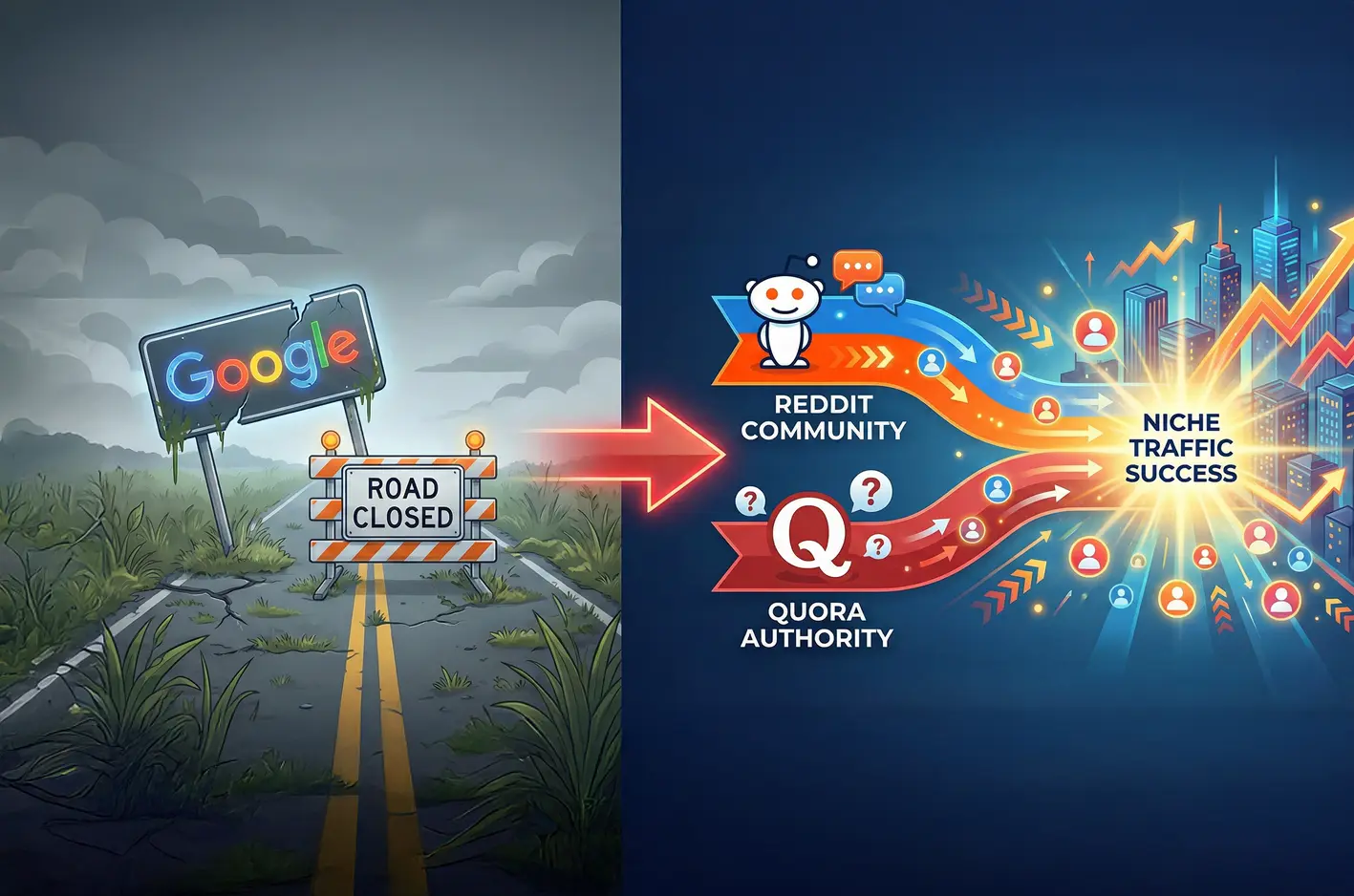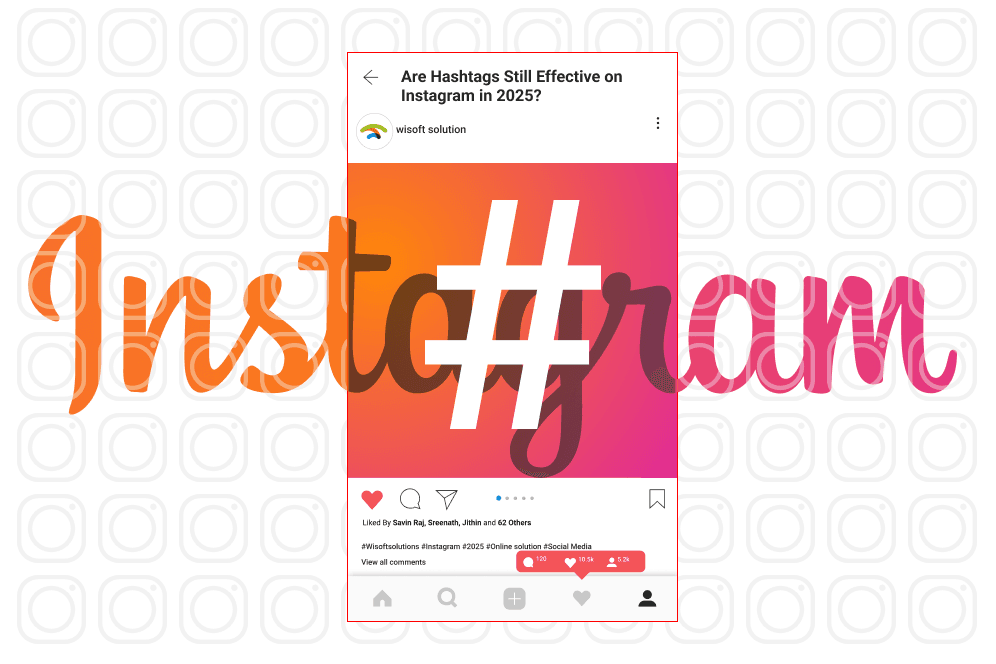11 Best SEO Blogs To Follow In 2025
Reading Time: 11 min

If you work in marketing today, you have probably felt this: one week your traffic is up, the next week a new Google update rolls out, and your top pages start slipping.
You are not imagining it. Google makes hundreds of changes to search every year, with several major core updates that can move entire industries up or down in the results. At the same time, organic search still drives around half of all trackable website traffic for many brands, even in the age of social and AI search.
So the real advantage is no longer just “doing SEO”. It is knowing where to get trusted, fast, practical guidance when things shift — and having the right strategy in place with a professional SEO services in Bangalore.
This guide walks through the top SEO websites and SEO resources for marketers who want less guesswork and more predictable growth, plus how to build a simple reading habit around them.
What makes an SEO blog worth following?
Before we jump into a list of the best SEO blogs, it is useful to know how to judge them. Not every blog with “SEO” in the header deserves a spot in your bookmarks.
Here is a quick checklist you can use:
- Data first, opinions second Do they reference experiments, case studies or external research, or is everything framed as “I think”? The strongest SEO resources for marketers usually show the data behind their claims.
- Clear connection to business outcomes Good posts show how to turn an idea into traffic, leads or revenue. Beware posts that only talk about impressions or “visibility” with no next step.
- Up to date with Google and AI search With AI overviews and generative engines influencing a growing share of organic traffic, blogs must talk about how SEO and content strategies are changing, not just repeat 2018 advice.
- Actionable, not just inspirational Look for checklists, templates, examples and screenshots that you or your team can replicate, not just high-level theory.
Keep that lens in mind as you explore the list of top SEO websites below.
Best SEO blogs for strong fundamentals and strategy
If you are building or leading a marketing function, these are the “foundation layer” blogs that should be on your radar.
1. Semrush Blog
Why follow it:
Semrush's blogs is like an SEO university that never sleeps. You will find everything from beginner explainers on ranking factors to advanced guides on log file analysis and SERP features.
Good for: teams that want both strategy and how to execute using tools.
Example topics:
- Complete SEO checklists for new websites
- Deep dives into content marketing frameworks
- Step-by-step guides to keyword research and competitor analysis
A practical way to use it: when your team starts a new SEO initiative, search the Semrush blog for that topic and build your internal playbook from their latest articles.
2. Ahrefs Blog
Why follow it:
Ahrefs is famous for data-heavy content and very honest experiments. They often release large-scale studies that get cited across the industry.
Good for: marketers who like to see actual numbers and “here is what happened when we tried this” rather than generic how tos.
Example topics:
- Massive link index studies that show what actually correlates with rankings
- Content pruning and cleanup case studies
- Real examples of pages recovering from drops after core updates
If you are pitching budget or headcount, Ahrefs blog posts can be great “proof” to show leadership that a tactic works.
3. Moz Blog
Why follow it:
Moz has been teaching SEO for more than a decade. Their blog still sets the tone on many topics, especially for marketers who are less technical.
Good for: framing concepts in a way that non-specialists in your company can understand.
Example topics:
- Whiteboard-style breakdowns of complex SEO ideas
- Guides to domain authority, link equity and on-page basics
- Clear explanations of how search engines interpret content
Point product managers or brand leads to Moz when they need to understand why SEO is asking for a particular change.
4. HubSpot Blog
Why follow it:
HubSpot is not just an SEO company; it is a full funnel marketing machine. Their SEO content is tightly connected to content strategy, lead generation and sales enablement.
Good for: marketing leaders who want SEO resources for marketers that support wider revenue goals, not only traffic goals.
Example topics:
- SEO friendly web design and UX principles
- Integrated content calendars that serve both SEO and social
- Reports on marketing trends and channel performance
If you run a small team, HubSpot helps you align SEO with email, CRM and paid campaigns.
5. Backlinko
Why follow it:
Backlinko is known for long-form, highly visual content and “one big guide that covers everything you need”.
Good for: advanced practitioners who want specific playbooks they can give to a junior exec and say, “follow this”.
Example topics:
- Link-building techniques, broken down with outreach scripts and examples
- Detailed checklists for on-page optimisation
- Guides to creating content that earns links in competitive niches
Backlinko posts pair nicely with more news-heavy SEO resources for marketers, such as Search Engine Land.
SEO news and algorithm update blogs you should not ignore
You do not need to read every SEO news story, but you definitely should know where to look when your rankings move.
Google Search Central Blog
If you only follow one source for algorithm insights, make it Google’s own Search Central blog.
Here you will see:
- Core update announcements
- Clarifications about crawling, indexing and structured data
- Official guidance on site quality and spam
When something big changes, this is where you verify if it is an official update or just noise.
Search Engine Land and Search Engine Journal
These two are the “breaking news” hubs of search.
They publish:
- Same-day coverage of algorithm updates
- Interviews with Googlers and leading SEOs
- Columns with tactical advice on PPC, local SEO and analytics
A realistic habit: skim their email newsletters a few times a week, then only click through when something directly affects your industry or tech stack.
Search Engine Roundtable
This site is more niche, but extremely useful.
It watches:
- Volatility in search results
- Early chatter from SEO communities
- Small product changes in Google Search and tools
If you suspect an unconfirmed update is happening, this is often where you will see it discussed first.
Expert analysis blogs: Marie Haynes, Brodie Clark, Glenn Gabe
After every major update, these consultants publish detailed breakdowns of what changed and what types of sites were hit.
For example:
- Marie Haynes often explores how E E A T and “helpful content” quality signals play out in real audits.
- Brodie Clark is known for hands-on experiments with rich results, image thumbnails and SERP features.
- Glenn Gabe shares long, transparent case studies about traffic drops and recoveries.
When leadership asks, “Why did this update affect us?”, these are some of the best SEO blogs to reference.
Specialist SEO resources for marketers who want to go deep
Once your basics are solid, you can add a few specialist blogs that match your focus.
Technical SEO & crawling
- Onely — crawl budget, JS SEO, indexation, site migrations
- Aleyda Solis — international sites, hreflang, faceted nav
Content strategy & on-page excellence
- Content Marketing Institute — governance and editorial process
- Yoast SEO blog — schema, readability, WordPress-focused advice
Advanced experiments & link strategy
- Zyppy / Cyrus Shepard — title tag research, internal linking, click behavior
- Detailed — deep playbooks for link building and competitive research
These are ideal SEO resources for marketers who already know the basics and want to squeeze extra performance from mature sites.
Why the Wisoft SEO blog deserves a place in your bookmarks
Most of the sites above are global. They are brilliant, but they are also written for a very broad audience.
If you are building in India, selling into the region or simply want examples that look a little more like your world, it helps to add at least one local perspective to your list of best SEO blogs.
That is where the Wisoft Solutions India blog comes in.
On our blog, you will find:
- Bangalore and India-focused case studies
- Plain language breakdowns of complex updates
- Practical, tool agnostic how tos
- What changed
- Why it matters
- What experiment or fix will you run in response?
For example, how mid-market brands compete with marketplaces in organic search, or how regional languages change keyword strategy.
We translate Google announcements and global conversations into “here is what this means for your next quarter’s roadmap”.
Whether your stack uses Semrush, Ahrefs, Search Console alone or a mix, the focus is always on what you can actually implement.
Think of it as a companion to the global top SEO websites. When a big update hits, you can read the global analysis, then come to Wisoft’s blog to see how it might play out for a growth-focused business in this region.
How to turn these top SEO websites into a simple learning system
Following every good SEO blog is a fast way to overload yourself. Instead, treat these SEO resources for marketers like a curated syllabus.
Here is a simple workflow you can use:
Pick 3 to 5 “always on” blogs
For most teams, this might be: Semrush, Ahrefs, Google Search Central, one news site like Search Engine Land and one expert like Marie Haynes.
Add 1 or 2 context-specific blogs
For example, Only if your site is very technical, Content Marketing Institute if you have a content-heavy funnel, and the Wisoft blog if you operate in or from India.
Create a shared reading ritual
Once a week, have one person summarise the most useful article they read in a short internal note or slide. Focus on:Turn insights into tests, not rules
Instead of saying “Backlinko says this works, so we must do it”, frame it as “we will test this on two categories for 60 days and measure impact”.
Review your list every quarter
Blogs evolve. If one starts publishing fluff or outdated recommendations, replace them with another of the best SEO blogs that still delivers fresh value.
Do this, and your team will stop reacting in panic to SEO news and start using those SEO resources for marketers as a quiet competitive advantage.
Conclusion
SEO will keep changing. Core updates, AI overviews, new SERP features, privacy laws, device shifts, all of it. What does not change is the value of having a trusted set of guides that help you navigate without losing sight of revenue and brand goals.
Pick a handful of top SEO websites that match your stage and market, build a light but consistent reading habit, and use what you learn to run better experiments, write better content and make better decisions.
And if you ever feel you would rather have a team that already lives inside these blogs and tools every day, the specialists at Wisoft Solutions India are always happy to talk through your search challenges over a call, not just a form fill.
FAQs
1. What are the best SEO blogs for beginners to start with?
If you are new to SEO, the best SEO blogs to start with are Semrush, Moz, HubSpot and Yoast. They explain concepts in simple language, show examples from real sites and often include checklists you can follow step by step. Once you are comfortable with the basics, you can add more advanced top SEO websites like Ahrefs and Backlinko to your reading list.
2. Which SEO resources for marketers should I follow for Google update news?
For algorithm updates and new features, keep an eye on Google Search Central, Search Engine Land, Search Engine Journal and Search Engine Roundtable. These SEO resources for marketers focus heavily on search news, so they will usually be the first to cover a core update, a spam policy change or a new SERP feature that might affect your brand.
3. How often should I read SEO blogs to stay current?
You do not need to read every post from the best SEO blogs. For most marketers, a weekly rhythm works well. Set aside 30 to 45 minutes once a week to skim headlines from your chosen SEO resources for marketers, then read one or two articles in depth that relate to projects you are running right now.
4. Are SEO blogs enough to learn SEO on my own?
SEO blogs are a great starting point, especially the best SEO blogs that combine theory with real case studies. However, you only really learn when you apply what you read, track results and adjust. Use top SEO websites for guidance, then practice on your own site, a side project or a client project so you can see how search engines respond.
5. How do I avoid information overload from so many SEO resources for marketers?
Start by limiting yourself to a small set of top SEO websites that truly match your needs and skill level. Use RSS, email digests or a shared company channel to collect new posts in one place, then review them once a week. Anything that does not help your current goals gets archived. This way, you still benefit from the best SEO blogs, without letting them consume your entire calendar.

























